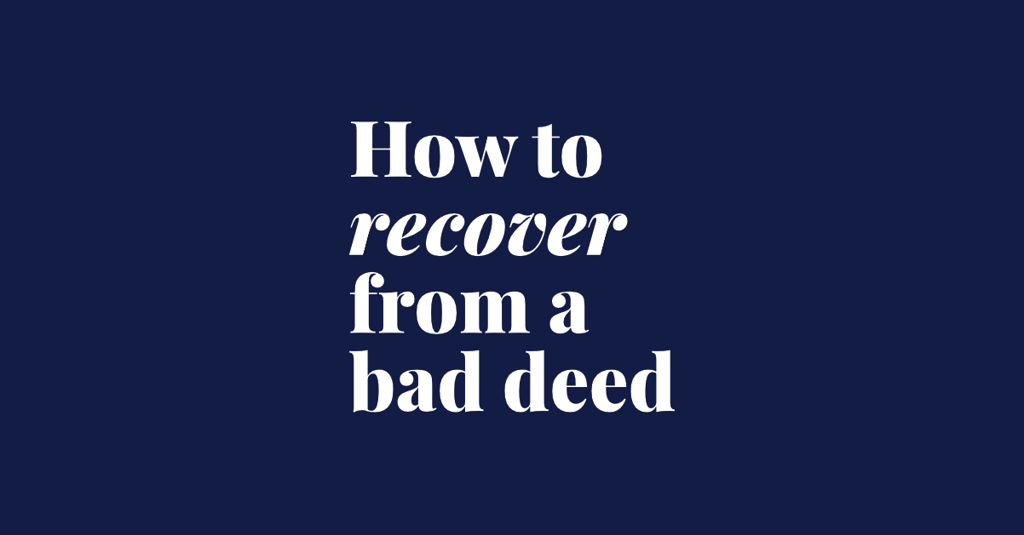How to recover from a bad deed
Imam Mohammad Aasim Mirza
7/14/20192 min read


It is important to remember that we are not perfect. So if you do something wrong and realise your mistake, be grateful to Him عزوجل because it means your ʿīmān—faith—is still alive. If you made a mistake, follow it up with something good, because the good will erase the bad. Allah عزوجل says in the Qurʿān (39:53):
قُلْ يعِبَادِي الَّذِينَ أَسْرَفُوا عَلَى أَنْفُسِهِمْ لاَ تَقْنَطُوا مِنْ رَحْمَةِ اللَّهِ إِنَّ اللَّهَ يَغْفِرُ الذُّنُوبَ جَمِيعًا إِنَّهُ هُوَ الْغَفُورُ الرَّحِيمُ
“Say, ‘[God says], ‘My servants who have harmed yourselves by your own excess, do not despair of God’s mercy. God forgives all sins: He is truly the Most Forgiving, the Most Merciful.’”
In relation to this verse, Qurṭubī and Ibn Kathīr write that Saʿīd b. Jubayr رضي الله عنه relates from Ibn ʾAbbās رضي الله عنهما, that there were some individuals who had committed grave atrocities, including the unjust killing of many people and the perpetration of numerous shameful and immoral acts. Troubled by their past actions, they approached the blessed Prophet صلى الله عليه وآله وسلم and said, “The religion you invite us to is undoubtedly good, but we have a concern. When we reflect on the enormity of the major sins we have already committed, we wondered, if we were to embrace Islam, do you think our repentance would be accepted?” In response to their heartfelt query, Allah عزوجل revealed this verse to the blessed Prophet صلى الله عليه وآله وسلم, providing an answer that was both merciful and reassuring.
The essence of the verse underscores a profound truth: so long as a person sincerely seeks forgiveness from Allah عزوجل before the arrival of death, their repentance will be accepted, regardless of the severity of their sins. This divine promise extends even to sins as grave as kufr—disbelief—and shirk—associating partners with Allah عزوجل. A genuine tawbah—repentance—has the power to wipe away all sins, no matter how severe. Thus, no one should ever despair of the boundless mercy and forgiveness of Allah عزوجل.
ʿAbdullāh b. ʿUmar رضي الله عنهما remarked that, among all the verses of the Qurʿān, this particular verse conveys the most powerful message of hope for sinners. However, Ibn ʿAbbas رضي الله عنهما held that another verse carried an equally profound assurance of forgiveness. Allah عزوجل says in the Qurʿān (13:6):
إِنَّ رَبَّكَ لَذُو مَغْفِرَةٍ لِّلنَّاسِ عَلَىٰ ظُلْمِهِمْ
“Indeed, your Lord is the Lord of forgiveness for the people despite their wrongdoing”
This knowledge should reassure those burdened by the weight of their past, that the Mercy of Allah عزوجل is infinite. No matter how far one may have strayed, the door of repentance is always open. We should never become hopeless to the point we stop doing good things; about this, the blessed Prophet صلى الله عليه وآله وسلم is narrated to have said:
وَأَتْبِعْ السَّيِّئَةَ الْحَسَنَةَ تَمْحُهَا
“Follow a bad deed with a good deed and it will erase it.” — Tirmidhī #1987
Allah عزوجل is not in need of our perfection, He is in need of nothing. We are in need of Him عزوجل. So the next time you burden yourself with the worries of ‘am I doing good enough?’ then just remember to live your life and try your best in everything you do. Do good towards others but seek its reward from Him.
And Allah عزوجل and His Messenger صلى الله عليه وآله وسلم know best.
